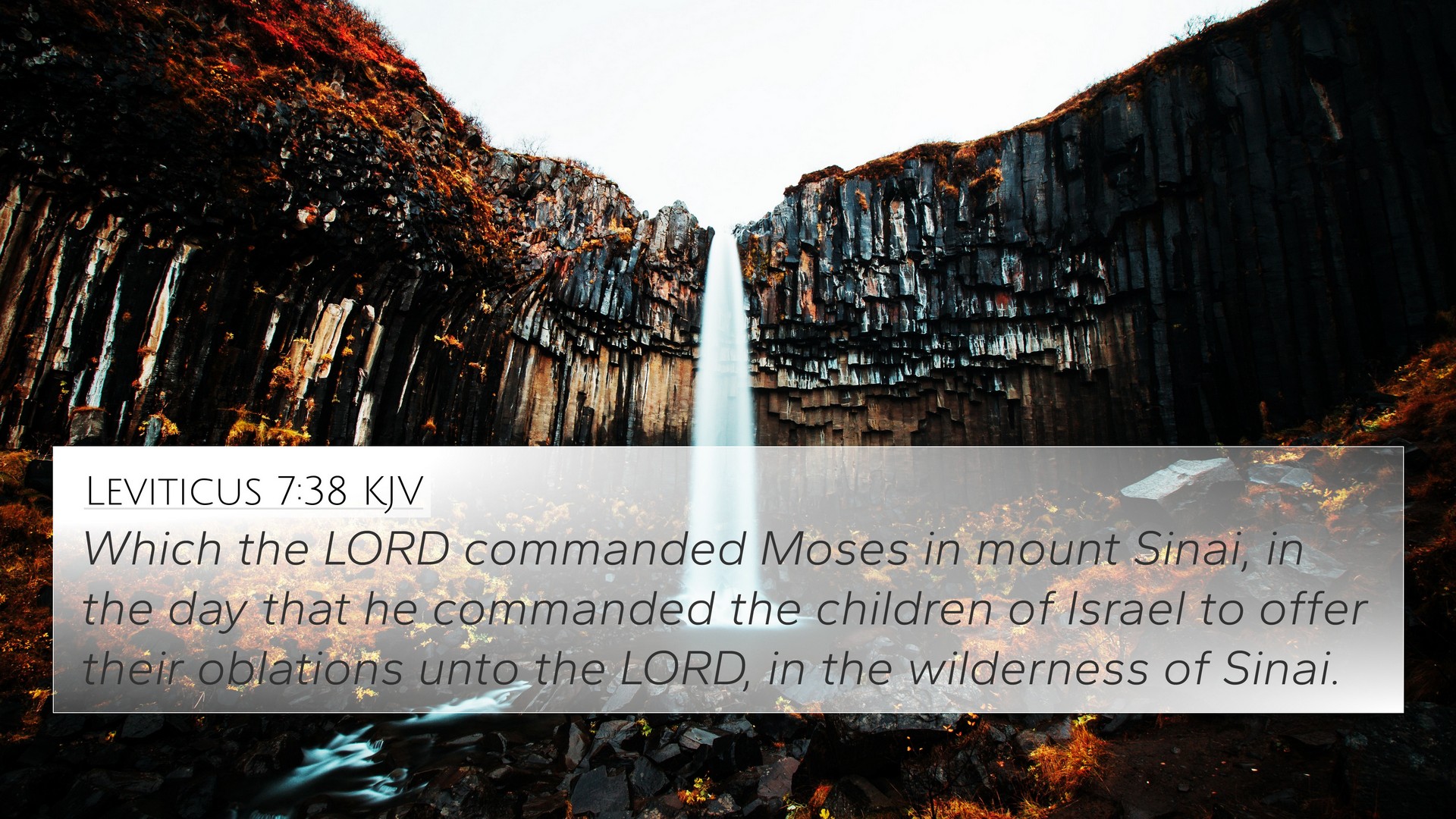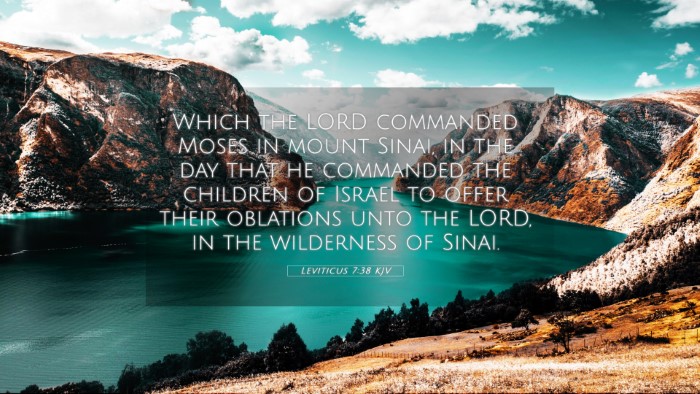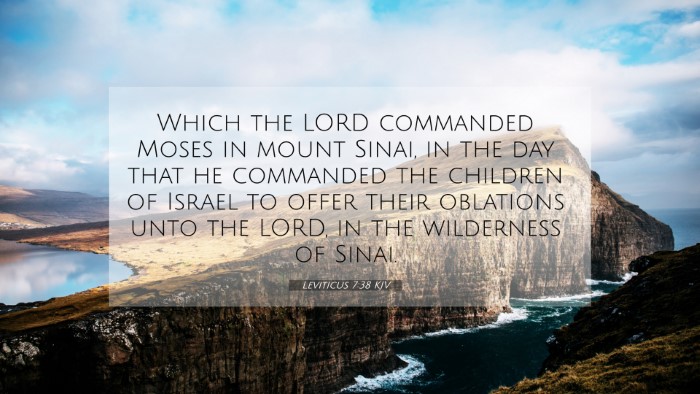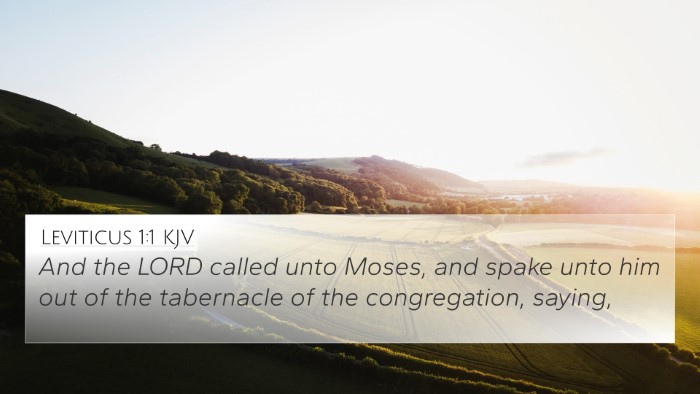Understanding Leviticus 7:38
Bible Verse: Leviticus 7:38
"Which the Lord commanded Moses on Mount Sinai, in the day that he commanded the children of Israel to offer their oblations unto the Lord, in the wilderness of Sinai."
Leviticus 7:38 concludes a detailed legal section regarding the offerings that the Israelites were to bring before God. This verse emphasizes the divine origin of the commandments given to Moses regarding these sacrificial practices.
Commentary Insights
-
Matthew Henry's Commentary
Matthew Henry notes the significance of the offerings as a means of approaching God. The commandments were not just arbitrary rules but were part of God’s holy standards for worship and communion. He emphasizes that these laws served to sanctify the people and to set them apart for God's service, reflecting deeper spiritual truths.
-
Albert Barnes' Commentary
Albert Barnes reflects on the historical context, mentioning how these commands served a purpose in establishing the priestly duties and ensuring that the Israelites remained holy before God. He stresses the importance of obedience to these directives as a means of maintaining covenantal relationship with God.
-
Adam Clarke's Commentary
Adam Clarke highlights that this verse underscores the methodical approach God took in His instructions toward the Israelites. He argues that the offerings were designed not only for atonement but also as acts of worship and gratitude, showing that the Israelites were to be devoted to the Lord in all aspects of their lives.
Bible Verse Cross-References
- Exodus 23:18 - Discusses the significance of not offering the blood of a sacrifice with leaven.
- Leviticus 6:12-13 - Elaborates on the continual fire on the altar, symbolizing God's constant presence.
- Hebrews 10:1-4 - Connects the sacrificial system with Christ’s ultimate sacrifice, highlighting its limitations.
- Psalm 40:6-8 - Addresses God's desire for obedience over mere ritualistic sacrifice.
- Matthew 5:23-24 - Encourages sincere worship, emphasizing reconciliation before offerings.
- Romans 12:1 - Illustrates the New Testament understanding of offering one’s body as a living sacrifice.
- 1 Peter 2:5 - Describes believers as a spiritual house, offering spiritual sacrifices acceptable to God.
Thematic Bible Verse Connections
The theme of sacrificial offerings permeates the entire Bible, signifying the depth of communion between God and man.
Old Testament Themes
In the Old Testament, offerings were vital for representing the acknowledgment of sin, gratitude, and covenant responsibilities:
- Genesis 4:3-5 - The offerings of Cain and Abel and their divine reception.
- Leviticus 22:29 - Instructions for acceptable sacrifices, highlighting holiness.
- Malachi 1:8 - Condemnation of improper offerings, reflecting God’s standards.
New Testament Correlation
The New Testament continues the theme of sacrifice but transforms it through the lens of Christ's atoning work:
- John 1:29 - John the Baptist identifies Jesus as the "Lamb of God," replacing the sacrificial system.
- Colossians 1:20 - Speaks of reconciliation through Christ's blood shed on the cross.
Tools for Bible Cross-Referencing
For deeper understanding, various tools can aid in exploring Bible verse cross-references:
- Bible Concordance: A comprehensive index for locating specific verses and themes.
- Bible Cross-Reference Guide: Offers systematic links between verses for thematic studies.
- Cross-reference Bible Study Materials: Resources designed for enriching Bible study sessions.
Conclusion
Leviticus 7:38 is a reminder that God is meticulous about how His people come before Him. By referencing other scriptures, we can see how these ancient practices establish a foundation that leads to the fulfillment found in Christ. Understanding the cross-references and thematic connections between verses grants us insight into God's redemptive narrative throughout Scripture.



